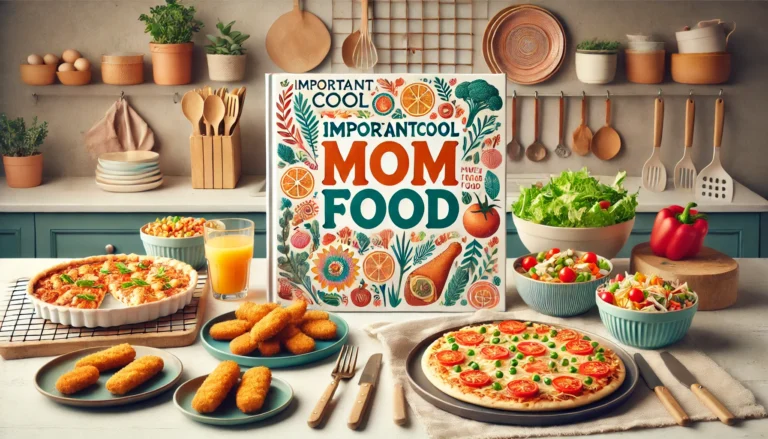
Introduction
In a world where time is always in short supply, moms often feel overwhelmed by the need to provide nutritious meals while juggling multiple responsibilities. With effective strategies, ImportantCool MomFood can revolutionize how you approach meal preparation, ensuring it’s manageable and enjoyable.
The Power of Seasonal Produce
Using seasonal produce is one of the easiest ways to enhance the quality and flavor of your meals. Not only is it cost-effective, but it also reduces the carbon footprint associated with out-of-season imports. Seasonal fruits and vegetables inspire creativity in the kitchen, encouraging the use of various colors, textures, and flavors that appeal to the entire family.
Reducing Food Waste with Smart Meal Planning
A well-thought-out meal plan helps reduce unnecessary food waste, a growing concern for many households. To further minimize waste:
- Adopt a “first in, first out” rule for perishables.
- Store leftovers in clear containers to ensure they are used promptly.
- Incorporate “clean-out-the-fridge” nights, turning scraps into delicious stir-fries or frittatas.
Smart planning supports sustainability while saving money.
The Rise of Plant-Based Options
Shifting toward plant-based eating doesn’t mean eliminating meat; instead, it’s about embracing balance. Start with simple changes, such as adding beans to soups or experimenting with tofu in stir-fries. These options are not only nutritious but also offer diverse flavors, making mealtime exciting and healthy for everyone.
Meal Prepping: A Busy Mom’s Best Friend
Busy moms can streamline their weeks with effective meal prepping. Designate one day for shopping, chopping, and cooking. Preparing individual portions of meals like grain bowls, salads, or pasta dishes ensures that nutritious choices are always within reach. These prepped meals are perfect for packed lunches or quick dinners, especially when time is limited.
How to Save Time with Effective Cooking Techniques
Busy families benefit immensely from efficient cooking techniques. Beyond slow cookers and one-pot recipes, consider the power of sheet pan meals. These involve roasting proteins and vegetables together, creating a balanced dish with minimal effort. Additionally, investing in quality kitchen tools, like sharp knives and high-speed blenders, can significantly reduce prep time.
The Importance of Sharing Meals for Family Bonding
Shared mealtimes are invaluable for fostering family bonding. To make them special, set aside time to eat together without distractions like phones or TV. Creating a welcoming table environment with favorite dishes encourages everyone to participate, strengthening familial connections and creating cherished traditions.
Health Benefits of Nutritious, Home-Cooked Meals
Home-cooked meals allow moms to prioritize their family’s health. Dishes made from scratch reduce reliance on processed foods, which often contain harmful additives. Families can enjoy meals made with whole, natural ingredients. These meals can help boost immunity. They can also increase energy and support long-term health.
Embracing Family Recipes for a Legacy of Love
Passing down family recipes adds emotional depth to cooking. These dishes often come with stories and memories, turning meals into meaningful experiences. Moms can preserve family heritage and teach valuable cooking skills by involving kids in preparing traditional recipes.
Tips for Involving Kids in the Kitchen
Getting kids involved in the kitchen not only lightens the workload but also teaches them essential life skills. Here are some simple ways to include them:
- Let younger kids wash fruits and vegetables.
- Teach older children how to measure ingredients or stir sauces.
- Turn cooking into a fun activity by letting them create their own pizza toppings or sandwich combinations.
Involving kids fosters independence and makes them more excited about mealtimes.
How to Create a Balanced Weekly Menu
Creating a balanced menu doesn’t have to be complicated. Begin by dividing meals into categories like proteins, carbs, and vegetables. A sample weekly plan might include:
- Monday: Grilled chicken with roasted sweet potatoes and steamed broccoli.
- Tuesday: Lentil curry with brown rice.
- Wednesday: Sheet pan salmon with asparagus and quinoa.
Planning ahead ensures variety while maintaining a focus on balanced, nutritious meals.
Conclusion
With these strategies, ImportantCool MomFood transforms mealtime from a daily challenge into an opportunity for creativity, health, and connection. Whether it’s through embracing seasonal produce, mastering meal prepping, or passing down family recipes, moms can create meals that reflect both love and care. By prioritizing these approaches, you can nourish your family while making the process enjoyable and sustainable.
FAQs About ImportantCool MomFood
1. What is important MomFood?
ImportantCool MomFood refers to a comprehensive approach for busy moms to prepare nutritious, efficient, and family-friendly meals. It combines techniques like meal planning, using seasonal produce, reducing food waste, and incorporating healthy cooking habits.
2. How can I start meal prepping as a busy mom?
Start small by dedicating one day a week to meal prep. Focus on simple tasks like chopping vegetables, cooking grains, and preparing freezer-friendly meals. Use containers to portion out meals for the week, making it easier to grab and go.
3. Why is using seasonal produce important?
Seasonal produce is fresher, more flavorful, and often more affordable than out-of-season options. It also supports local farmers and reduces the carbon footprint associated with transporting non-seasonal items.
4. How can I reduce food waste in my kitchen?
You can reduce food waste by:
- Planning meals.
- Using leftovers creatively, like turning roasted veggies into soups.
- Storing perishable items properly to prolong freshness.
5. What are some easy plant-based meal ideas for beginners?
- Lentil and vegetable soup.
- Chickpea curry with rice.
- Veggie stir-fry with tofu.
- Black bean tacos with avocado.
- Plant-based meals can be both simple and delicious, making them ideal for families.
6. How can I involve my kids in the cooking process?
Let younger children help with simple tasks like washing produce or stirring the batter. Older kids can learn to measure ingredients, chop with supervision, or cook easy recipes. Involving kids makes cooking a fun, educational activity.